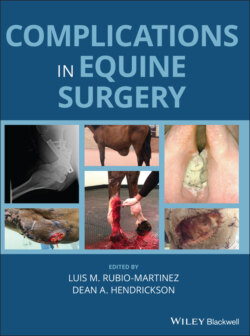Читать книгу Complications in Equine Surgery - Группа авторов - Страница 175
Early Postoperative Complications Bleeding after Cryosurgery
ОглавлениеDefinition
Hemorrhage from the cryoablation site that is evident in the first 2–3 hours after surgery
Risk factors
Tumors that require debulking to the level of the surrounding skin before freezing
Tumors from which a biopsy is taken prior to freezing
Tumors located over a large superficial vein [14]
Pathogenesis
Limited bleeding after cryosurgery is normal in tumors that have been debulked or when a biopsy has been taken, even if good hemostasis was obtaind prior to freezing. Bleeding results from vasodilation during the thawing phase. It is commonly self‐limiting, but can become objectionable to the owners [20].
Excessive postoperative bleeding is a rare complication which could occur as a result of necrosis of the wall of an intact vessel that was frozen together with the tumor (e.g. saphenous vein for sarcoids on the inner aspect of the thigh). The author has not experienced this complication yet, most likely because coagulation necrosis of the frozen tissue also results in vessel thrombosis before rupture of the wall would occur.
Diagnosis
Obvious hemorrhage from the surgical site
Prevention
When tumors are debulked or a preoperative biopsy is taken, care should be taken to achieve good hemostasis (e.g. using radiofrequency electrocoagulation).
When treating lesions are resting directly over a large superficial vein, the latter can be ligated proximally and distally to prevent hemorrhage when the tissue sloughs [14].
Contact probes should be allowed to detach spontaneously from the tissue during the thawing phase. Avulsion of the probe can precipitate unnecessary bleeding because of tissue tearing [1].
A pressure bandage can be applied over the site for the first 24 hours to prevent hemorrhage [14].
Treatment
Management of postoperative bleeding consists in providing hemostasis, either by clamping and/or suturing the vessel or by applying a pressure bandage.
Expected outcome
The prognosis is good because postoperative bleeding after cryosurgery is never life‐threatening.
